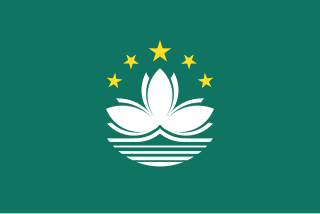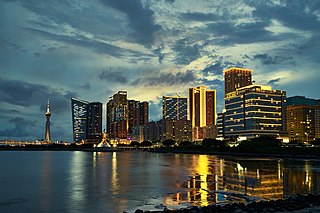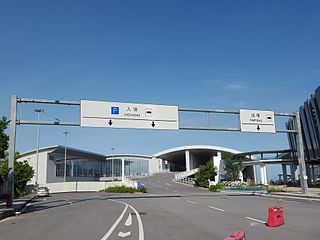
Macau, also spelled Macao and officially the Macao Special Administrative Region of the People's Republic of China (MSAR), is a city and special administrative region of the People's Republic of China in the western Pearl River Delta by the South China Sea. With a population of about 680,000 and an area of 32.9 km2 (12.7 sq mi), it is the most densely populated region in the world.

Macau is a Special Administrative Region on the southern coast of China. It is located at the south of Guangdong Province, on the tip of the peninsula formed by the Zhujiang estuary on the east and the Xijiang on the west. Macau is situated 60 km (37 mi) west of Hong Kong, and 145 km (90 mi) southwest of Guangzhou, the capital of Guangdong Province. It is situated immediately east and south of Zhuhai.

The economy of Macau has remained one of the most open in the world since its handover to China in 1999. Apparel exports and gambling-related tourism are mainstays of the economy. Since Macau has little arable land and few natural resources, it depends on mainland China for most of its food, fresh water, and energy imports. Japan and Hong Kong are the main suppliers of raw materials and capital goods. Although Macau was hit hard by the 1997–98 Asian financial crisis and the early 2000s recession, its economy grew approximately 13.1% annually on average between 2001 and 2006. Macau is a full Member of the World Trade Organization. Public Security has greatly improved after handover to the People's Republic of China. With the tax revenue from the profitable gambling industry, the Macau government is able to introduce the social welfare program of 15 years of free education to all Macau citizens. In 2015, Macau's economy saw a sharp decrease due to the reduced spending by visitors from Mainland China since the Anti-corruption campaign under Xi Jinping.

Transport in Macau includes road, sea, rail and air transport. Road transport is the primary mode of transport within Macau, although a new rail system opened in December 2019 serving the areas of Taipa and Cotai. The main forms of public transport are buses and taxis.

Macau is an autonomous territory within China. A Portuguese colony until 1999, Macau has a diverse culture firmly rooted in Cantonese culture, with a mix of influences from East Asia and Western Europe. Macau is known for being the largest gambling center in the world.

Macanese patois, known as patuá to its speakers, is a Portuguese-based creole language with a substrate from Cantonese, Malay and Sinhala, which was originally spoken by the Macanese community of the Portuguese colony of Macau. It is now spoken by a few families in Macau and in the Macanese diaspora.
Macanese cuisine is mainly influenced by Cantonese cuisine, Portuguese cuisine, and influences from Southeast Asia and the Lusophone world, due to Macau's past as a Portuguese colony and long history of being an international gambling centre known for its vibrant hospitality and tourism industry. Minichi, egg tarts, pork chop buns, ginger milk and almond cakes are some of the region's most common delicacies. Common cooking methods make use of various spices such as turmeric, coconut milk, and cinnamon to give dishes an extra kick of aroma and enhancement of taste. However, many routinely consumed dishes in Macau belong to a subclass (Heungshan) of Cantonese cuisine. Many Macanese dishes resulted from the spice blends that the wives of Portuguese sailors used in an attempt to replicate European dishes. Besides local Chinese ingredients and seasonings, Macanese dishes also include those from Europe, Latin America, Africa, India, and Southeast Asia. Genuine Portuguese and Spanish cuisine can also be found in Macau. Common cooking techniques include baking, grilling, and roasting; the former is seldom seen in other styles of Chinese cooking.
The Basic Law of the Macao Special Administrative Region of the People's Republic of China is the constitutional document of Macau, replacing the Estatuto Orgânico de Macau. It was adopted on 31 March 1993 by China's National People's Congress and promulgated by President Jiang Zemin; it came into effect on 20 December 1999, following the transfer of sovereignty over Macau from Portugal to China.

Fortaleza do Monte is a fort in Santo António in Macau. It is the historical military centre of Macau. The fort forms part of the "Historic Centre of Macau" and is a UNESCO World Heritage Site.

Telephone numbers in Macau are eight-digit numbers. Fixed land line numbers starts with 2, and Mobile (cellular) phone numbers starts with 6. Calls from Macau to mainland China, Hong Kong, Taiwan and Portugal are treated as international calls.
The Macau Open Badminton Championships is an open international championship in badminton held in Macau since 2006.

The Taipa Ferry Terminal is located in Taipa, Macau SAR.
Companhia de Telecomunicações de Macau S.A.R.L. known as CTM is a telecommunications company in Macau, which obtained a monopoly franchise license from the government except for mobile telephone services.
TDM Ou Mun owned by TDM - Teledifusão de Macau, S. A., is the first broadcasting channel in Macau. It is free-to-air, and in the Cantonese language. It is mainly focused on local news and informative programs such as "TDM News", "Macau Forum"and "Financial Magazine" etc. Also, it includes local living programs such as "Our people, our life" etc.

Lotus TV Macau, owned by Macau Lotus TV Media via Satélite, Limitada, is a Macanese satellite TV channel broadcast via satellite through Apstar 7.

The Macao Science Center also known as Macau Science Center is a science center in Sé, Macau, China.

The Macau University of Science and Technology Football Field is a football stadium in Taipa, Macau, China. It is used mainly for Macau First Division Football League matches and athletics.

Portuguese Macau covers Macau's history from the establishment of a Portuguese settlement in 1557 to the end of Portuguese colonial rule and transfer of complete sovereignty to the People's Republic of China in 1999. Macau was both the first and last European holding in China.
Sands China Limited is an integrated resort developer and operator in Macau and a subsidiary of Las Vegas Sands Corp, the owner of The Venetian Las Vegas and The Palazzo.

Agriculture in Macau is a minor industry in Macau, China. Around 2% of Macau's land is used for agriculture.













